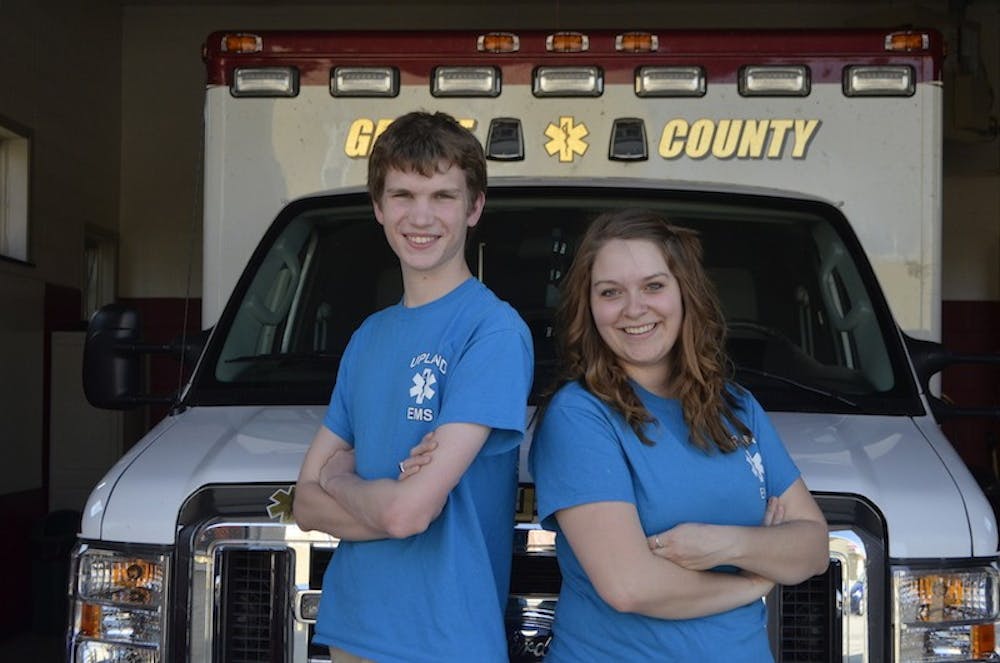By Lindsay Robinson | Echo
One minute you are hanging out with friends enjoying a nice relaxing evening, and the next minute you are running out the door, off to save lives. While this may sound like the plot to a superhero movie, for two Taylor students it's just part of the job description.
Freshman Mark Dykstra and sophomore Kayla Rees volunteer with Upland's Emergency Medical Services (EMS). Dykstra is a first responder and Rees works as an Emergency Medical Technician (EMT). For them, going to work means waiting with a pager in hand, and being prepared for their quiet night to be turned upside down.
"There's no general day," Dykstra explained. "We're just volunteers so our schedule is completely crazy. Upland EMTs only function at night from 6p.m. to 6a.m."
It is possible to get pulled away to an emergency at any minute. Work, meetings, and even time with friends often take a back seat.
"I work in the catering department so I've been on call twice while I've been working and it's like in the middle of a banquet and my pager goes off and I have to run out," Rees said. "Some people are kind of irritated by it but other people are just like 'Yea go!'"
The reaction from fellow floormates is either one of confusion or surprise, but overall most people think that it is cool to have a superhero for a friend.
"One of my friends, when I'm on call, likes to draw a little stick figure with a cape on my board outside my room," Rees said.
Rees and Dykstra first became interested with Emergency Medical Services during high school. Dykstra saw flyers in his school's office and decided that it would be a perfect opportunity to learn about the medical field. Reese became involved with EMS in during high school and admits she was drawn to it because it provided an opportunity to get out of school. Both found they had a passion for EMS work and were happy to discover a way to volunteer in Upland. While Reese took classes last semester to earn her EMT license, Dykstra is working as a first responder until he can complete the process.
"I'm just a first-responder which is like the base level of a provider," Dykstra said. "In any ambulance you have to have one EMT. They are in charge of the call. And then you have the first-responder or helper, kind of like me. And then you have the driver. My role is just to take vitals, to make sure they have what they need."
Each shift presents new challenges and learning experiences.
"It's incredibly formative," Dykstra explained. "Every call you get is a new experience, a new chance to learn, to learn from those who are more experienced than you"
Much of what Rees and Dykstra learn at college, gets put into practice in real-life emergency situations. Dykstra is a Bio-Pre Med major and is especially interested in the workings of the medical system. Rees is a psychology major and enjoys being able to calm her patients.
"Sometimes they don't need to be stressed, but if you're in an ambulance, you're probably going to be stressed about it," Rees said. "I am not very prone to overreacting to things so I really like being able to talk people through those things. . . It's a cool side of human nature to see people interacting and helping each other in sometimes really awful situations."
Interactions are crucial in situations where every second counts. The team has to effectively work and learn together in order for the unit to function well.
"EMTs have a very good connection with each other most of the time," Rees said. "If you get back to the station and it's been a really bad run, people will ask you about it. They've been through similar things so they know exactly what you're feeling."
Managing the mental state of each team member is essential as any minute can turn into a matter of life and death. How the team responds to each call is crucial.
"My roommate put up a poster on my wall that said, 'EMS hours of boredom punctuated by minutes of terror", because we just have our pager on us all night and we just wait and wait," Dykstra said.
Although each member of the team has a specific role, each learn and grow from each other. Overall, it is the patient's welfare that binds the team together.
"I think the most important thing we do as EMT is just to be there and listen to the patient," Dykstra said.
Rees finds it especially rewarding to get to know people in the Upland community that she otherwise would never had known.
"This experience has been really one of the best decisions I've made while being at Taylor, which is funny because it's not related to Taylor at all,"Rees said.
Reese's volunteer work allows her to bridge the gap between Taylor and the Upland community. Although it takes time and commitment, she is able impact the community in a positive way.
"A lot of times, we have this attitude about ministry where we are like, 'I'm going to go help those people,' but then we are not like, 'We're coming along side of you to work with you and build this community up alongside you guys,'"Rees said.
When she first started working for the Upland ambulance service last semester, she faced some skepticism based on her status as a Taylor student. She found that, as in all jobs, respect is something that had to be earned through hard work and dedication to the team.
"It's important for me to be humble, work, and not take advantage of things that I have," Rees explained.
(Thumbnail photograph by Brittany Smith)



